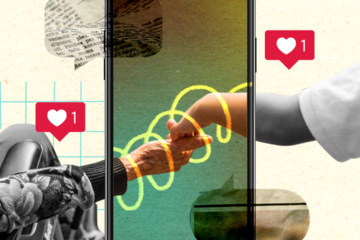When sharing isn’t caring: how period trackers endanger women’s privacy
The rise of the femtech industry saw the emergence of different apps, services, and startups that make use of technology to deliver solutions to female-specific healthcare needs.
Among the innovations in women’s healthcare, period tracker apps have amassed an estimated 50 million users worldwide. In 2020 alone, period tracker app Flo ranked first as the most popular health tracker app in the world as reported in the USwitch Health App Index.
Period tracker apps have notably aided women in making decisions regarding their reproductive health. The calendar feature common among period tracker apps allows users to input details about their menstruation and gives them insights on when their next period cycle will be and when they will be most fertile.
Faith*, a college student and freelance artist, uses the period tracker app Clue to monitor her period cycle alongside her mental health. “May maintenance medicine ako for my mental health condition, so syempre kailangan in line silang lahat kasi kapag may isang hindi, parang magdo-domino effect yun” (“I take maintenance medicine for my mental health condition, and that has to be in line with my menstrual cycle because if one of them falls out of line, that will create a domino effect”), she said.
Meanwhile, third year arts student Avery Bacon noted that using the MyCalendar period tracker app helped her remember her last period cycle and make sense of sudden changes in her mood.
“Kasi pag feel ko sobrang cranky ko lately, ganyan, may data. Kung emotional ba talaga ako kasi sa stress or PMS na ba to, pag chinecheck yung app, oh, four days na lang, okay, it makes sense.” (“Whenever I feel cranky, there’s data available to explain it or back it up. Whenever I feel overly emotional, whether it’s because of stress or PMS, I check the app and see for example that I’m four days away from my period, and it makes sense.”)
However, the promise of convenience and wealth of insight provided by period tracker apps comes at a hidden and hefty price, with the currency being the sensitive data entrusted to them by their users.
The trouble with sharing
In 2022, nonprofit Mozilla Foundation surveyed the privacy and security features of ten pregnancy apps, ten period trackers, and five wearables as part of their yearly *Privacy Not Included report. Majority of the apps they surveyed were revealed to have gaps in their privacy policies and features and shared sensitive health information with third parties without users’ consent.
London-based charity Privacy International (PI) also expressed concern about the volume of personal and health information collected from period tracker users.
After conducting a dynamic analysis of data shared by five period tracker apps to Facebook (now Meta) in 2019, PI found that the apps Maya by Plackal Tech and MIA by Mobapp Development Limited shared an extensive amount of sensitive health data with the tech giant. The sharing happens through the Facebook Software Development Kit (SDK), a set of software components that allows developers to understand how their apps are being used and provide users with personalized ads.
In addition to collecting personal information such as the user’s name, age, email address, and location, sensitive data relating to their weight, mood, period length, contraception use, and sexual activity was also disclosed by the apps to third-party sponsors and advertisers.
Similar findings were published by the organization in a 2020 report that revealed how much information is being collected and stored by period tracker apps. The app Flo, for instance, encouraged its users to enter information about their personal life such as medicine intake, diet, and masturbation habits and stored them in its company server rather than locally on the user’s device.
Flo has also been the subject of controversy after a Wall Street Journal report detailed its disclosure of in-app activities, including the start of a user’s period and their intention to get pregnant, to Facebook in 2019. A subsequent review by the United States Federal Trade Commission found that Flo made false claims about how it handled sensitive information, resulting in a settlement requiring the affirmative consent of its users prior to processing health information as well as an independent review of its privacy practices.
Even with data privacy policies in place, the volume of health data collected and stored by period tracker apps raises questions about how relevant they are to their functionality and how they may be subjected to unauthorized use.
“Information about a person’s menstrual period for example may reveal health conditions related to a woman’s reproductive health. It might reveal pregnancy, miscarriages, and other information that a woman might not want to disclose to just anyone. If sexual activity is likewise recorded, the information, if compromised, might be misused,” said former Deputy Privacy Commissioner Dr. Ivy D. Patdu in an email interview.
Drawing boundaries
While there remain a lot of risks associated with the use of period tracker apps, there are legal frameworks that women can use as a basis for holding app developers accountable for how they collect, store, and use health data.
In the Philippines, the Data Privacy Act of 2012 (DPA) classifies information about individual’s health and sexual activities as sensitive information. Under the same law, users may ask the developers to delete their data if it is no longer necessary or has been unlawfully collected.
If a Filipino user believes that their privacy has been violated, Patdu recommended that they gather information regarding the unauthorized processing of their health data in the form of screenshots or recordings. It would also be beneficial to recall and record or write down how they have used the app, what they remember about using the app, and how they found out about the unauthorized processing.
In the case of period tracker apps developed outside the country, Patdu noted that users can still file a complaint even if the developer is not from the Philippines, although the process may be challenging.
“They can go through the National Privacy Commission and hopefully be able to get assistance,” she added.
Demanding accountability
To uphold their legal obligation to protect their users’ right to privacy, Patdu stressed that developers should practice the principle of privacy by design, meaning that privacy principles must be present from app conceptualization to implementation and monitoring.
“The DPA imposes specific obligations on those processing personal and sensitive personal information such as adhering to principles of transparency, legitimate purpose, and proportionality. These include ensuring that the processing, from collection to disposal, has a lawful basis.”
PI also recommended in its 2020 report that period tracker app developers craft privacy policies that are accessible and easy to read for their users. In this way, women from different backgrounds can be made aware of how their health data and privacy can potentially be compromised, be given avenues to raise concerns on their privacy, and demand that these concerns be addressed.
While app developers are legally obligated to safeguard the privacy of their users, people who plan on using period tracker apps can also take steps to ensure the safety of their own health data.
Faith believes that looking into an app’s privacy features and policies should be a priority for all its potential users. “If people want to use period apps, parang syempre, siguro, research about it muna. Kasi syempre, mahirap naman na oo ka nang oo sa terms tas di ka aware.” (“If people want to use period apps, they should research about it first. It’s dangerous to simply agree to an app’s terms of service without understanding what it entails.”)
Providing women with tools and services to better their well-being need not come at the expense of their most intimate details. At the end of the day, their decision-making for their own reproductive health can only be enhanced when apps such as period trackers are designed with their safety and privacy in mind.
*Not her real name
This was written by FMA intern Claire Pillos.



0 Comments